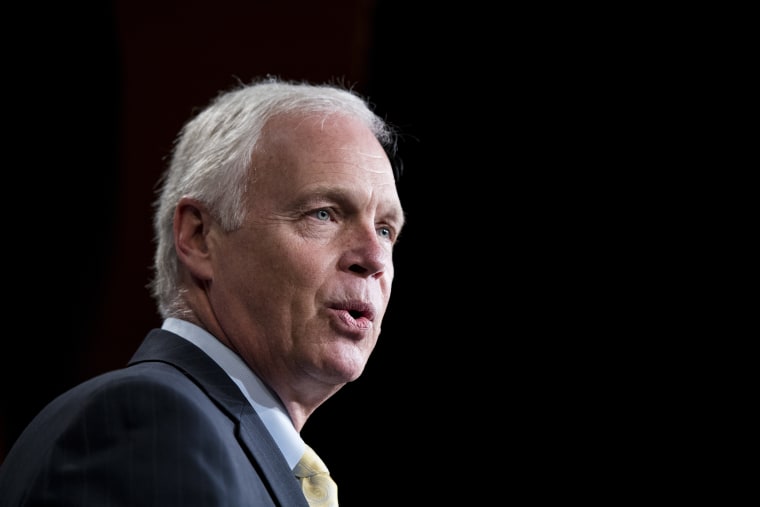Sen. Ron Johnson, R-Wis., said Sunday that "most" of President Donald Trump's advisers were trying to figure out "some way" to get him to release a hold on about $400 million in Ukrainian military aid, an effort at the center of Democrats' impeachment inquiry.
"I understand that most of President Trump's advisers wanted the military aid released," Johnson, who had pushed Trump to release the aid, said on CNN's "State of the Union."
"And they were trying to figure out some way, shape or form to convince President Trump to approve that release," he said. "It's certainly what I was trying to do in my phone call to him on August 31. So I don't have a problem with advisers trying to figure out some way shape or form to convince the boss to do this."
In transcripts released late last week by the House Intelligence Committee, Army Lt. Col. Alexander Vindman, the National Security Council's top Ukraine expert, and Fiona Hill, Trump's former adviser on Russia, testified that they were told that acting White House chief of staff Mick Mulvaney was at the center of the pressure campaign to have Ukraine publicly announce investigations into Democrats, particularly former Vice President Joe Biden and his son, Hunter Biden, to receive the roughly $400 million in military aid.
Mulvaney has declined to testify before the impeachment probe despite having been subpoenaed. He has said publicly that the aid was partly conditioned on Ukraine's investigating a debunked conspiracy involving Democrats and the 2016 election — a theory that absolved Russia for hacking Democratic emails and instead claimed that Ukraine framed the country — before walking back that statement.
Johnson also discussed the Aug. 31 in which he asked Trump whether aid was contingent on the announcement of investigations. Johnson said Trump strongly denied that allegation, although, in subsequent testimony, Trump's ambassador to the European Union, Gordon Sondland, said he spoke with a top Ukrainian official a day after Johnson's phone call and said "the resumption of U.S. aid would likely not occur until Ukraine provided the public, anti-corruption statement that we had been discussing for many weeks."
"I'm the one that raised the issue from my phone call with Gordon Sondland the day before where he brought up some type of ... something that Ukraine had to do before President Trump would release the funding, and when I brought up that scenario, President Trump immediately, and I've described it as adamantly and vehemently, denied it," Johnson said, adding that he remains "sympathetic to President Trump's legitimate concerns about corruption."
As CNN's Jake Tapper noted, the only instances of "corruption" that Trump brought up in his July 25 phone call with Ukrainian President Volodymyr Zelenskiy, a summary of which was released by the White House, involved the debunked conspiracy and the business dealings of Hunter Biden, who sat on the board of a Ukrainian gas company that was under investigation. Tapper pointed to testimony from Trump administration officials who said "corruption" was code for those two things.
"Well again, that's their impression," Johnson said. "I've never heard the president say, 'I want to dig up dirt on a potential 2020 opponent.' What I've always heard the president consistently concerned about is: 'What happened in 2016? How did this false narrative with Russian collusion with my campaign occur? Why was I strapped with the special counsel?' It's a very human desire."

